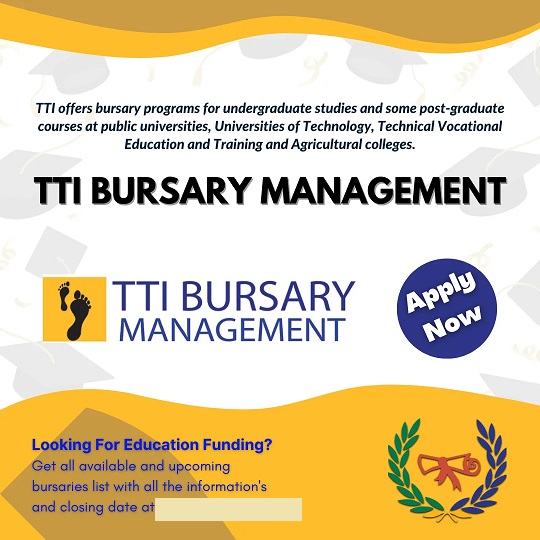Exploring Fields Funded by TTI Bursaries
Access to higher education remains a challenge for many deserving students across South Africa due to financial constraints. This is where dedicated awards like TTI Bursaries aim to make a difference.
TTI Bursaries focuses on increasing opportunities for youth to gain technical and technological qualifications most relevant to national economic development. The program is primarily funded by leading engineering companies like Aurecon, Hatch, and Worley.
But what specific education fields, specializations and programs can you explore with TTI funding support? This comprehensive guide examines key focus areas in detail.

ALSO SEE:
How to Check Your TTI Bursary Application Status
How Much is the TTI Bursary Monthly Allowance?
Understanding TTI Bursary Focus Areas
True to its name derived from Technical Training Initiative, TTI sponsor companies prioritize skills contributing to infrastructure advancement across South Africa and Africa.
While list varies year-on-year, TTI largely funds studies related to:
- Engineering disciplines
- Information Technology
- Specialised Business qualfications
The emphasis is on technical/technological credentials supporting data-driven decision making and problem solving – aligned to improving public systems and enhancing quality of life.
Let’s explore key funded categories under each focus area:
Engineering Fields
Engineering forms the largest segment, powering catalytic infrastructure projects regionally:
- Civil Engineering: Designing and executing transportation systems, public spaces, residential projects etc.
- Electrical Engineering: Planning, optimising and maintaining power generation, transmission and distribution infrastructure.
- Mechanical Engineering: Maximising efficiency and reliability of heavy machinery, manufacturing plants, processing units etc.
- Chemical Engineering: Enhancing yields, safety and environmental compliance across chemicals, petrochemicals and processing industries.
- Industrial Engineering: Structuring workflow, technology integration, productivity analysis and data-driven enhancements within operational facilities and systems.
- Mining Engineering: Ensuring safe, efficient and sustainable mineral extraction and processing lifecycles.
The emphasis is on scalable engineering capabilities enhancing infrastructure robustness and ecosystem advancement.
Information Technology Programs
The rise of data and automation calls for enhanced digital abilities across public and private sector:
- Computer Science: Building competency in system design, programming, data structures and algorithm optimisation.
- Information Systems: Bridging understanding of emerging technologies alongside pragmatic business analysis and process re-engineering.
- Cybersecurity: Developing skills to envision, engineer and manage end-to-end data and network security frameworks.
- Software Engineering: Instilling best practices around planning, architecting, building and deploying complex software applications.
- Data Science: Blending statistical, computational and subject matter expertise to extract embedded insights from scattered data.
- IT Project Management: Training students on orchestrating technology implementations spanning roadmap development, resource allocation and product delivery.
Well-rounded technological grounding prepares students to architect solutions harnessing automation and analytics to uplift communities at scale.
Specialized Business Qualifications
Beyond technical credentials, selected business programs add value:
- Accounting: Building acumen across financial reporting, taxation, auditing and managerial decision making.
- Finance: Enhancing ability to model valuations, risk, investments and dynamic monetary conditions towards prudent fund allocation.
- Business Management: Developing multifaceted leadership skills – strategizing, marketing, optimizing operations and enhancing customer experiences.
- Economics: Understanding both micro and macro dynamics that influence financial decisions and drive policymaking.
- Marketing: Creating intelligence to identify unmet needs, craft compelling solutions and engineer delightful user engagement.
- Human Resources: Balancing people operations across talent acquisition, development, collaboration and cultural excellence.
The programs equip next-gen leaders to apply ethical, progressive business thinking towards executing win-win solutions.
Assessing TTI Bursary Eligibility
While fields drive selection criteria, academic consistency and family financials play a key role when shortlisting applicants.
Typical Eligibility Conditions:
- South African citizenship
- Gross family income < R600,000 per annum
- Consistent academic performance (>60% average)
- Registered/Accepted for undergraduate studies in funded field
- No concurrent full scholarships/awards
- Passion for community upliftment
How are Decisions Made?
- Initial screening of family income documents and academic scores
- Evaluation of motivation essay and recommendations
- Interview shortlisted candidates on knowledge, drive and compatibility
- Final scoring based on holistic assessment across eligibility criteria
So make sure to put the effort upfront to make your application stand out!
Application Process and Timelines
Applications open around April-May each year for the upcoming academic year.
Process Steps
- Browse TTI Bursary Portal and create profile
- Select bursary programs of interest
- Submit supporting documents
- Attend regional assessment (if shortlisted)
- Receive application status update (by August-September)
Here are helpful links to begin your TTI funding application:
- TTI Bursary Website: https://ttibursaries.co.za
- Video Guide: https://youtu.be/xt6xZ612cPQ
- Application Checklist: https://bit.ly/3H6kaWf
Stay motivated and be thorough with your application to maximise your chances of unlocking TTI support towards an empowered career ahead!
Frequently Asked Questions
Here are some additional questions students have around TTI bursaries:
Who actually funds the TTI bursaries?
While TTI aggregates and awards them, leading engineering firms actually sponsor the bursary amounts based on their recruitment priorities. This includes Aurecon, Hatch, Worley and others.
If I switch majors, does the bursary still apply?
You need to remain in an approved field of study to retain your TTI bursary support across years. Changes require reapproval from your funding organisation.
Can I access other small awards along with the TTI bursary?
Yes, you can supplement funding via additional scholarships, food and housing allowances etc. though total funding is capped based on actual academic expenses.
Whether around eligibility, process or general inquiries – the TTI Bursary team is available at [email protected]. So do reach out for personalized assistance!
